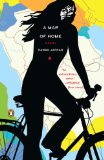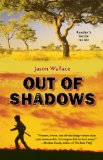Summary | Excerpt | Reading Guide | Reviews | Beyond the book | Read-Alikes | Genres & Themes | Author Bio

Nidali narrates the story of her childhood in Kuwait, her teenage years in Egypt, and her family’s last flight to Texas, offering a humorous, sharp but loving portrait of an eccentric middle-class family.
Nidali, the rebellious daughter of an Egyptian-Greek mother and a Palestinian father, narrates the story of her childhood in Kuwait, her teenage years in Egypt (to where she and her family fled the 1990 Iraqi invasion), and her family’s last flight to Texas. Nidali mixes humor with a sharp, loving portrait of an eccentric middle-class family, and this perspective keeps her buoyant through the hardships she encounters: the humiliation of going through a checkpoint on a visit to her father’s home in the West Bank; the fights with her father, who wants her to become a famous professor and stay away from boys; the end of her childhood as Iraq invades Kuwait on her thirteenth birthday; and the scare she gives her family when she runs away from home.
Funny, charming, and heartbreaking, A Map of Home is the kind of book Tristram Shandy or Huck Finn would have narrated had they been born Egyptian-Palestinian and female in the 1970s.
Coming-of-age themes are common, but the intelligent narration provides more than enough interest to sustain the momentum. Rare is the book that makes one stay up to finish it; this is one of them, simultaneously circling in its family dramas and spiraling outwards in its connections to history and place. Adult and teen readers alike would enjoy Nidali's honest portrayal. She's the Muslim equivalent of J.D. Salinger's Holden Caulfield, tender, caustic and wise in all the right moments...continued
Full Review
(669 words)
This review is available to non-members for a limited time. For full access,
become a member today.
(Reviewed by Karen Rigby).
Arabic Music is influenced by a history of conquest and contact with numerous countries including but not limited to Greece, Medieval Europe and Turkey. Elements of Arabic music can also be found in non-Arabic countries. A few common characteristics are the connection between music and poetry, and the use of maqamat. In Arabic music, a maqam (plural maqamat) is a set of notes. The nearest equivalent in Western classical music would be a mode.
Traditional instruments include:
This "beyond the book" feature is available to non-members for a limited time. Join today for full access.

If you liked A Map of Home, try these:

by Ayad Akhtar
Published 2012
American Dervish is a brilliantly written, nuanced, and emotionally forceful look inside the interplay of religion and modern life.

by Jason Wallace
Published 2011
A compelling, thought-provoking novel about race, bullying and the need to belong, set in Africa.